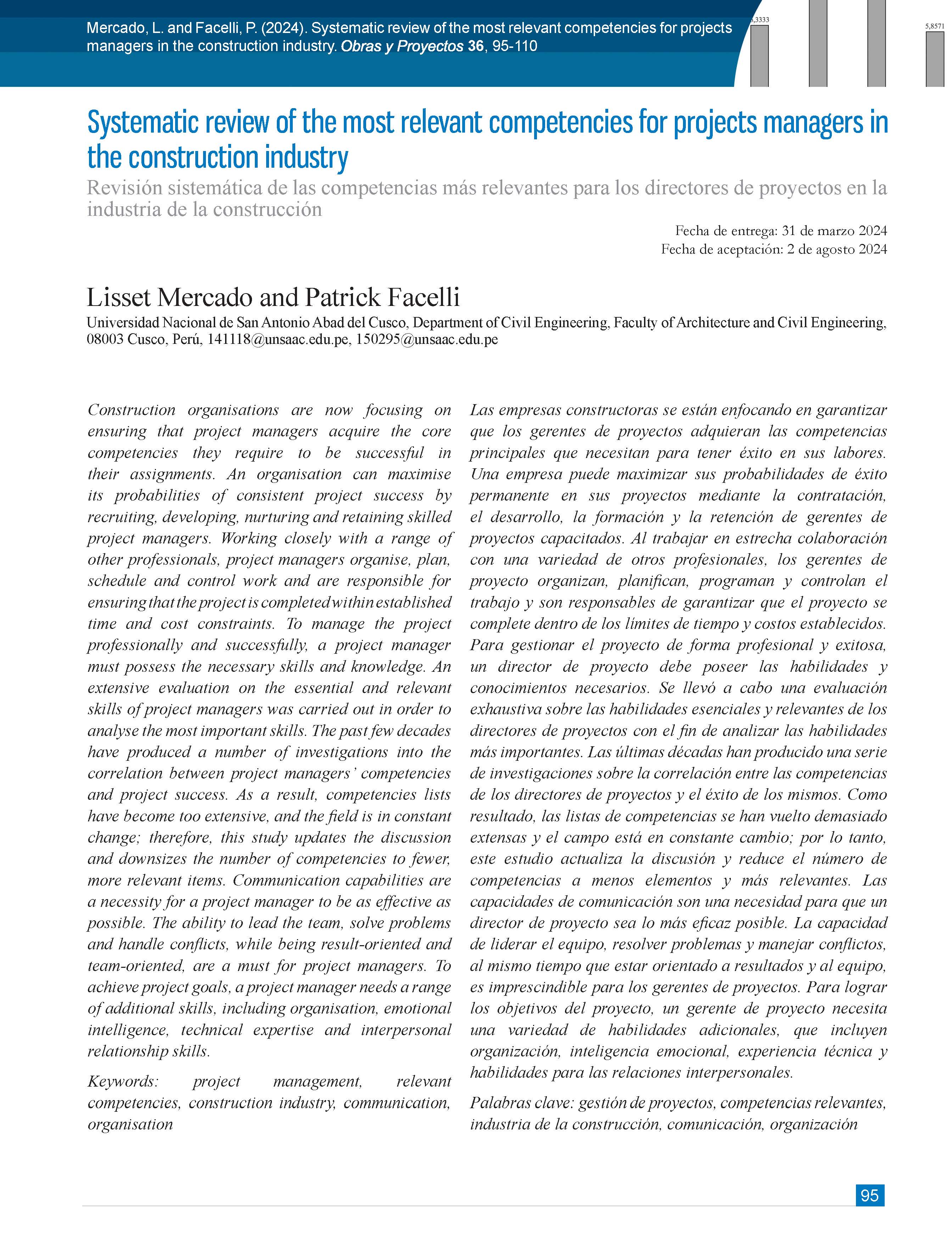Revisión sistemática de las competencias más relevantes para los directores de proyectos en la industria de la construcción
DOI:
https://doi.org/10.21703/0718-2813.2024.36.3011Palabras clave:
Gestión de proyectos, Competencias relevantes, Industria de la construcción, Comunicación, OrganizaciónResumen
Las empresas constructoras se están enfocando en garantizar que los gerentes de proyectos adquieran las competencias principales que necesitan para tener éxito en sus labores. Una empresa puede maximizar sus probabilidades de éxito permanente en sus proyectos mediante la contratación, el desarrollo, la formación y la retención de gerentes de proyectos capacitados. Al trabajar en estrecha colaboración con una variedad de otros profesionales, los gerentes de proyecto organizan, planifican, programan y controlan el trabajo y son responsables de garantizar que el proyecto se complete dentro de los límites de tiempo y costos establecidos. Para gestionar el proyecto de forma profesional y exitosa, un director de proyecto debe poseer las habilidades y conocimientos necesarios. Se llevó a cabo una evaluación exhaustiva sobre las habilidades esenciales y relevantes de los directores de proyectos con el fin de analizar las habilidades más importantes. Las últimas décadas han producido una serie de investigaciones sobre la correlación entre las competencias de los directores de proyectos y el éxito de los mismos. Como resultado, las listas de competencias se han vuelto demasiado extensas y el campo está en constante cambio; por lo tanto, este estudio actualiza la discusión y reduce el número de competencias a menos elementos y más relevantes. Las capacidades de comunicación son una necesidad para que un director de proyecto sea lo más eficaz posible. La capacidad de liderar el equipo, resolver problemas y manejar conflictos, al mismo tiempo que estar orientado a resultados y al equipo, es imprescindible para los gerentes de proyectos. Para lograr los objetivos del proyecto, un gerente de proyecto necesita una variedad de habilidades adicionales, que incluyen organización, inteligencia emocional, experiencia técnica y habilidades para las relaciones interpersonales.
Referencias
Aggiag, M.A. (2005). The impact of client attributes on project success: a study of UK public construction projects. Doctoral thesis, University of Northumbria at Newcastle, UK.
Ahadzie, D.K. (2007). A model for predicting the performance of project managers in mass house building projects in Ghana. PhD thesis, University of Wolverhampton, UK.
Ahmadi Eftekhari, N., Mani, S., Bakhshi, J. and Mani, S. (2022). Project manager competencies for dealing with socio-technical complexity: A grounded theory construction. Systems 10(5), 161.
Ahsan, K., Ho, M. and Khan, S. (2013). Recruiting project managers: A comparative analysis of competencies and recruitment signals from job advertisements. Project Management Journal 44(5), 36–54.
Alshammari, F., Yahya, K. and Haron, Z.B. (2020). Project manager’s skills for improving the performance of complex projects in Kuwait construction industry: A review. IOP Conference Series: Materials Science and Engineering 713(1), 012041.
Alvarenga, J.C., Branco, R.R., Guedes, A.L.A., Soares, C.A.P. and Silva, W.S. (2019). The project manager core competencies to project success. International Journal of Managing Projects in Business 13(2), 277–292.
Ballesteros-Sánchez, L., Ortiz-Marcos, I. and RodríguezRivero, R. (2019). The impact of executive coaching on project managers’ personal competencies. Project Management Journal 50(3), 306–321.
Bedingfield, J.D. and Thal, A.E. (2008). Project manager personality as a factor for success. Portland International Conference on Management of Engineering & Technology PICMET, 1303–1314.
Blom, T., Steyn, H. and Bond-Barnard, T.J. (2023). The role of project manager competence in project management success: the case of a utility company. South African Journal of Industrial Engineering 34(1), 143-154.
Ceran, T. and Dorman, A.A. (1995). The complete project manager. Journal of Architectural Engineering 1(2), 67–72.
Chipulu, M., Neoh, J.G., Ojiako, U. and Williams, T. (2013). A multidimensional analysis of project manager competences. IEEE Transactions on Engineering Management 60(3), 506–517.
Crawford, L. (2000). Profiling the competent project manager. Project Management Research at the Turn of the Millennium. Research Conference 2000. Paris, France. Project Management Institute PMI, USA.
Creasy, T. and Anantatmula, V.S. (2013). From every direction – how personality traits and dimensions of project managers can conceptually affect project success. Project Management Journal 44(6), 36–51.
Crisóstomo, A. y Herrera, R.F. (2018). Metodología de toma de decisiones para la selección de subcontratos en la industria de la construcción. Obras y Proyectos 24, 28-40.
Czuchry, A.J. and Yasin, M.M. (2003). Managing the project management process. Industrial Management & Data Systems 103(1), 39–46.
Dulewicz, V. and Higgs, M. (2000). Emotional intelligence – A review and evaluation study. Journal of Managerial Psychology 15(4), 341–372.
Dziekoński, K. (2017). Project managers’ competencies model for construction industry in Poland. Procedia Engineering 182, 174–181.
Edum-Fotwe, F.T. and McCaffer, R. (2000). Developing project management competency: perspectives from the construction industry. International Journal of Project Management 18(2), 111–124.
European Construction Institute (2011). Organisational project management competency frameworks. European Construction Institute. Loughborough, UK.
Ferris, G.R., Treadway, D.C., Perrewé, P.L., Brouer, R.L., Douglas, C. and Lux, S. (2007). Political skill in organizations. Journal of Management 33(3), 290–320.
Fryer, B.G. (2004). The practice of construction management. Wiley-Blackwell, Oxford, UK.
Geoghegan, L. and Dulewicz, V. (2008). Do project managers’ leadership competencies contribute to project success? Project Management Journal 39(4), 58–67.
Ghorbani, A. (2023). A review of successful construction project managers’ competencies and leadership profile. Journal of Rehabilitation in Civil Engineering 11(1), 76–95.
Giraldo, G.E., Pulido, G.H. and Leal, C.A. (2013). Project manager profile characterization in the construction sector in Bogotá, Colombia. Project Management Journal 44(6), 68–93.
Gruden, N. and Stare, A. (2018). The influence of behavioral competencies on project performance. Project Management Journal 49(3), 98–109.
Higgs, M. and Dulewicz, S.V. (2003). The design of a new instrument to assess leadership dimensions and styles. Henley Working Paper Series HWP 0311, University of Reading, UK.
Hwang, B.G. and Ng, W.J. (2013). Project management knowledge and skills for green construction: Overcoming challenges. International Journal of Project Management 31(2), 272–284.
Li, Y., Sun, T., Shou, Y. and Sun, H. (2020). What makes a competent international project manager in emerging and developing countries? Project Management Journal 51(2), 181–198.
Maqbool, R., Sudong, Y., Manzoor, N. and Rashid, Y. (2017). The impact of emotional intelligence, project managers’ competencies, and transformational leadership on project success: An empirical perspective. Project Management Journal 48(3), 58–75.
Montequin, V.R., Nieto, A.G., Ortega, F. and Villanueva, J. (2015). Managerial style profiles of successful project managers: A survey. Procedia Computer Science 64, 55–62.
Moradi, S. (2021). Project managers’ competencies in collaborative construction projects Academic dissertation, Tampere University, Finland.
Moradi, S., Kähkönen, K. and Aaltonen, K. (2020a). Comparison of research and industry views on project managers’ competencies. International Journal of Managing Projects in Business 13(3), 543–572.
Moradi, S., Kähkönen, K. and Aaltonen, K. (2020b). Project managers’ competencies in collaborative construction projects. Buildings 10(3), 50.
Nijhuis, S.A., Vrijhoef, R. and Kessels, J.W.M. (2015). Towards a taxonomy for project management competences. Procedia - Social and Behavioral Sciences 194, 181–191.
Nixon, P., Harrington, M. and Parker, D. (2012). Leadership performance is significant to project success or failure: a critical analysis. International Journal of Productivity and Performance Management 61(2), 204–216.
Podgórska, M., and Pichlak, M. (2019). Analysis of project managers’ leadership competencies: Project success relation: what are the competencies of polish project leaders? International Journal of Managing Projects in Business 12(4), 869–887.
PMI (2021). The standard for project management and a guide to the project management body of knowledge (PMBOK guide). 7th edition. Project Management Institute, Inc. USA.
Russell, J.S., Jaselskis, E.J. and Lawrence, S.P. (1997). Continuous assessment of project performance. Journal of Construction Engineering and Management 123(1), 64–71.
Sang, P., Liu, J., Zhang, L., Zheng, L., Yao, H. and Wang, Y. (2018). Effects of project manager competency on green construction performance: The Chinese context. Sustainability 10(10), 3406.
Sears, S.K., Sears, G.A. and Clough, R.H. (2008). Construction project management: A practical guide to field construction management. 5th ed., Wiley, Hoboken NJ, USA.
Shrivastava, S. (2007). Towards a new taxonomy of managerial competence: an open systems perspective. PhD thesis, Swinburne University of Technology, Melbourne, Australia.
Sunindijo, R.Y. (2015). Project manager skills for improving project performance. International Journal of Business Performance Management 16(1), 67-83.
Sunindijo, R.Y. and Zou, P.X.W. (2011). CHPT construct: essential skills for construction project managers. International Journal of Project Organisation and Management 3(2), 139-163.
Tett, R.P., Guterman, H.A., Bleier, A. and Murphy, P.J. (2000). Development and content validation of a “hyperdimensional” taxonomy of managerial competence. Human Performance 13(3), 205–251.
Toney, F. (2001). The superior project manager. Global competency standards and best practices. CRC Press, Boca Raton, USA.
Trivellas, P. and Drimoussis, C. (2013). Investigating leadership styles, behavioural and managerial competency profiles of successful project managers in Greece. Procedia - Social and Behavioral Sciences 73, 692–700.
Zhang, F., Zuo, J. and Zillante, G. (2013). Identification and evaluation of the key social competencies for Chinese construction project managers. International Journal of Project Management 31(5), 748–759.
Zimmerer, T.W. and Yasin, M.M. (1998). A leadership profile of American project managers. Project Management Journal 29(1), 31–38.

Descargas
Publicado
Número
Sección
Licencia

Esta obra está bajo una licencia internacional Creative Commons Atribución-NoComercial 4.0.







